ORAL HISTORY: David Mitchell $.50 Short in 21 Years
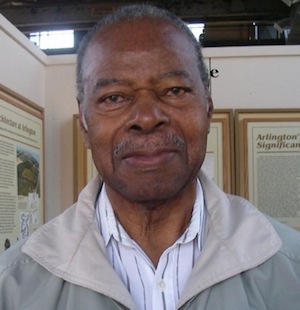
David Mitchell today (13 years after his remarks transcribed here). Photo courtesy Marion Naar
April 7, 2014
(EDITOR’S NOTE: Cape Charles Historical Society has for more than a decade been recording oral histories of the area’s earlier days. A grant from the Virginia Foundation for the Humanities enabled 15 interviews to be transcribed, and the Historical Society has made this one available for readers of the Wave. All the transcriptions may be read at the Cape Charles Museum.)
David Mitchell speaks April 12, 2001
PART 3
There was a company that came down called Union News; they took over the concession part of the building. They served all the meals, at the counter and in the dining room. They gave me a job as the dish and linen to the ferries and I did some custodian work also. I did that until the ferries stopped running. The last day out of Kiptopeke, I put the linen on the boat, turned the key into the secretary and left, not knowing if I had a job. As I was leaving I thought about the badge I used to wear, Badge 39, and I wanted to keep it as a souvenir. So I went back down and asked the lady for the key and said I left something in the laundry room. I went and got the badge and came back to give her the key and Mr. Forrest was in there. He said, “David, tomorrow morning I want you to bring some linen down to the Bridge. Get all of it out of the linen room and bring it down there.” I said, “I didn’t know if I had a job.” He said, “Oh yeah, you’re one of those who didn’t want your severance pay and wanted a job instead, so you got a job.” I said, “Fine,” and I was happy about that.
I started working down there in maintenance. I started off as custodian there. I had to go across the bridge and pick up the trash from the islands and South Plaza, clean up, and come back. And one day, Mr. Anderson, who was one of the people who worked in the office over there, told me Mr. Forrest was looking for a good man to work in the administration building — there was mostly women over there. He told Mr. Forrest, “Now there’s a good man for you right there! He comes in looking like that every day. Clean and neat.” Mr. Forrest said he wanted me as soon as possible, so I got off the truck and went over there. I worked there from 1964 until 1966. [Read more…]
ORAL HISTORY PT 2:
David Mitchell As Milkman, Baseball Pitcher, Cook

David Mitchell today (13 years after his remarks transcribed here). Photo courtesy Marion Naar
March 31, 2014
(EDITOR’S NOTE: Cape Charles Historical Society has for more than a decade been recording oral histories of the area’s earlier days. A grant from the Virginia Foundation for the Humanities enabled 15 interviews to be transcribed, and the Historical Society has made this one available for readers of the Wave. All the transcriptions may be read at the Cape Charles Museum.)
David Mitchell speaks April 12, 2001
PART 2
It didn’t last long before Mr. Gladstone got a car and started delivering milk in a car. And we put milk on all the ferries that ran here in town. I remember there was the Princess Anne, the Pocahontas, the DelMarva. Finally, they got the Northampton, the Accomac, and the Old Pointe Comfort, and the Elisha Lee. Anyway, we used to put milk on those ferries when they were running in town, especially the Princess Anne, Pocahontas and DelMarva.
I had a scary time once when I went on there to put some milk on one of them. I didn’t have much time to go up to put the milk up in the kitchen (I always had to carry it to the kitchen). On the Pocahontas, of course, they had a big dance floor there in the middle of the boat. You’d go up there and people would be dancing and I’m going through with two carries of milk, zigzagging trying to get to the kitchen. And the boat blew the horn to leave and I couldn’t get off! I ran down the steps and the boat was about 10 feet away, the guy grabbed me because I was coming so fast I guess I would have run overboard if he hadn’t grabbed me to stop me. And they just ribbed me all the way back. Told me I had to wash the dishes, had to paint the deck. They just told me everything. I was scared as I could be. But, anyway, I went over and came back. That was the only time that it ever happened. I found out all they were doing was needling me, giving me a hard time. [Read more…]
ORAL HISTORY: Delivering Milk by Horse and Wagon
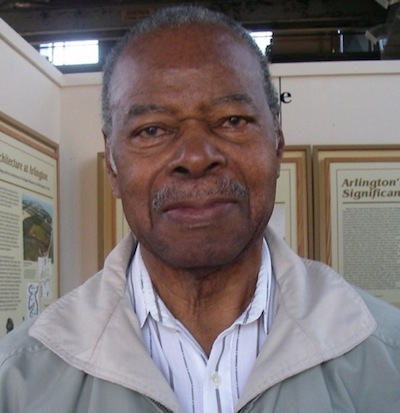
David Mitchell today (13 years after his remarks transcribed here). Photo courtesy Marion Naar
March 24, 2014
(EDITOR’S NOTE: Cape Charles Historical Society has for more than a decade been recording oral histories of the area’s earlier days. A grant from the Virginia Foundation for the Humanities enabled 15 interviews to be transcribed, and the Historical Society has made this one available for readers of the Wave. All the transcriptions may be read at the Cape Charles Museum.)
David Mitchell speaks April 12, 2001
PART 1
I was born in Baltimore, Maryland, and I left there at the age of five and came to Cape Charles. I lived with my aunt and uncle, Jesse Mitchell and Sally Mitchell. My uncle worked for the town back in those days. He used to haul garbage, and the garbage dump was over where the Coast Guard housing is right now [Washington Street east of Sea Breeze apartments]. Used to be the dump pile. They had a horse and wagon they used to haul garbage with.
I always loved having my own money, so at an early age my Uncle Jesse had me working. He used to do a little gardening and he would sell butter beans and tomatoes and stuff from his garden. And he would take orders from private homes to sell butter beans and we had to help shell them and so forth. And, of course, he would give us a little bit for helping and delivering. My aunt used to wash laundry for families and she did some housework also.
When I was about 12, Mr. Gladstone had a dairy. I know a lot of people are familiar with Gladstone Dairy over on the other side of Washington Avenue. His father had strawberries and stuff. I didn’t know that much about his father, but I did know Paul Gladstone. I used to watch the cows and they would graze along Washington Avenue. They had fields along it, but no fence. So I happened to be out there playing one day and he came by and asked me if I wanted to keep the cows from going out in the street. He’d give me something for doing it. Well, I was playing anyway, so I told him yes. So I would just throw a rock out and make them go back and then I would continue to play. I’d see them come over again and I’d throw and make them go back. And I guess he must have seen that I was faithful in what I was doing, so when I got a little older he gave me a job at the dairy. [Read more…]
ORAL HISTORY: Sinking Ships, Ice Breakers
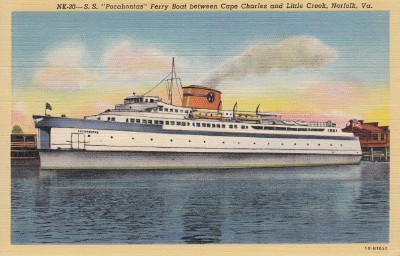
Pocahontas ferryboat steamed between Cape Charles and Norfolk, captained by Bill Evans.
March 3, 2014
(EDITOR’S NOTE: Cape Charles Historical Society has for more than a decade been recording oral histories of the area’s earlier days. In 2006, Bill and Jan Neville interviewed the late Capt. Bill Evans. A grant from the Virginia Foundation for the Humanities enabled 15 interviews to be transcribed, and the Historical Society has made this one available for readers of the Wave. All the transcriptions may be read at the Cape Charles Museum.)
Excerpts from a March 31, 2006, interview by Bill and Jan Neville of Ferryboat Capt. Bill Evans and his wife, Grace.
PART 4
CONCRETE SHIPS CONTINUED, BREAKING CHESAPEAKE ICE
You mentioned Les Morgan. What were some of the other captains?
Captain Morgan. Captain Stone, he was a head captain, Captain Justin Stone. There was a Captain Daniels, too, George Daniels. He was from the Norfolk side. They eventually took him off the boat and put him port captain. And then there was Frank — they took him off the boat and made him port engineer. And there was a Nolan Chandler, he was an engineer at one time, and they put him out there as superintendent.
Who was Stanley Lewis? Was he a captain?
Stanley Lewis? He was a captain.
Wilbur Brownley, do you know him? Ed Forrest?
I’ve heard of Brownley but don’t know him. Ed Forrest was a railroad guy. And Brownley, seems like he was railroad, too.
Those concrete ships. Were they WWI or WWII surplus? Did they have a name for them?
Oh, they’re from World War II. They carried freight. I only know them as concrete ships.
I had a friend out in the Pacific in WWII and he said when a Japanese bomb would hit one of those things the air was full of concrete chips shooting all over and the other ships would have to duck. It wasn’t shrapnel, it was concrete chunks coming at you. How did they get from Texas?
They towed them up here. They were floated.
How did you sink them?
That was easy!
Did they dynamite them?
What we did, we took them in there, put them in their place, then we pumped them full of water, each one of them, and put them on the bottom. Then we brought a dredge in and dredged all that out inside of the harbor and put all that dredging in there — in the ships. That settled the ships and that’s how they stayed there. It’s been a mystery to me, because when they first took those ships over there by law if the Virginia Ferry ever went out of business, or moved, they had to move the concrete ships. But it so happened, before the Virginia Ferry went out of business, the State took the ferries over. That’s prior to building the Bridge-Tunnel. So they got by with that one. So the concrete ships are still there. [Read more…]
ORAL HISTORY: Concrete Ships at Kiptopeke

Pocahontas ferryboat steamed between Cape Charles and Norfolk, captained by Bill Evans.
February 24, 2014
(EDITOR’S NOTE: Cape Charles Historical Society has for more than a decade been recording oral histories of the area’s earlier days. In 2006, Bill and Jan Neville interviewed the late Capt. Bill Evans. A grant from the Virginia Foundation for the Humanities enabled 15 interviews to be transcribed, and the Historical Society has made this one available for readers of the Wave. All the transcriptions may be read at the Cape Charles Museum.)
Excerpts from a March 31, 2006, interview by Bill and Jan Neville of Ferryboat Capt. Bill Evans and his wife, Grace.
PART 3
THE CONCRETE SHIPS AT KIPTOPEKE
[Grace]: Don’t forget to tell them what you did at Kiptopeke. The ships! The concrete ships!
I put them there. We had them towed up from Beaumount, Texas, both of them. And I had several that were already up there in ‘Squito Creek off Newport News. And anyway, they brought them all to Newport News anchorage and I had to go over there and bring them to Kiptopeke. I towed them with my tanker, my oil tanker.
That was called the “Kiptopeke” wasn’t it? The oil tanker’s name?
Yeah. Well me and another tug, we towed them on over there and put them in their place. Where they were supposed to be. In fact, what we done, we put them over there and I remember the last one we brought over, it was kind of getting dark, so we made it fast to the last upper end and we tied up alongside the ships, caught a nap. Said next morning we’ll sink it when it’s daylight. Got up the next morning and I start easing down and I saw the ship was gone! She drifted away and the wire cable I used to make her fast to the other ship, was laying down there in the water. Oh my goodness, that ship is out there and in the shipping lane and it’s a dead ship and concrete, oh boy! So we sailed along. We checked along the shore first and we found her up on the beach. Up toward Cape Charles. So we hooked on her and brought her back.
[Grace]: He said furniture and everything was still on those ships.
Yeah, a lot of things, tools —
[Grace]: Did you say they had a party on one of them?
Oh yeah. That was the first one up. They had that fixed up so you could have parties on that. That was Chandler and all that gang. . . . They had plenty of booze. That was a boozin’ gang.
[Grace]: Tell them about the hurricane and what happened during the hurricane at Kiptopeke.
Oh that was Hurricane Hazel. I was on the Pocahontas and we were coming across and they called me from Little Creek and told me tie up when you get to Kiptopeke. The storm just hit Cape Henry. So I went in there and tied up the number 2 bridge and unloaded. Just about the time I got unloaded, that wind struck. I put out nine 9″ dual lines to hold the bow and that broke everyone of them just like a shoe string.
Good grief!
I blew right around and I blew up on the beach. I tried to get out, I was going to try to get out through that hole, but it’s a good thing I didn’t because that would have blew me against the concrete for sure. So what I done, I wound up on the beach. And I said, oh me, here I am stuck. I won’t be able to get me off here. But they got railroad tugs over that night about midnight and got her back out. But anytime you touch bottom you have to take her to the shipyard. So that night I took her on up to the shipyard. Hauled her out, not a bit of damage at all, just a paint that was scraped off where she was riding on the bottom. So they cleaned her up and we were back out the next day. That was the Pocahontas. [Read more…]
ORAL HISTORY:
Bridegroom Goes Overboard From Ferryboat

Pocahontas ferryboat steamed between Cape Charles and Norfolk, captained by Bill Evans.
February 17, 2014
(EDITOR’S NOTE: Cape Charles Historical Society has for more than a decade been recording oral histories of the area’s earlier days. In 2006, Bill and Jan Neville interviewed the late Capt. Bill Evans. A grant from the Virginia Foundation for the Humanities enabled 15 interviews to be transcribed, and the Historical Society has made this one available for readers of the Wave. All the transcriptions may be read at the Cape Charles Museum.)
Excerpts from a March 31, 2006, interview by Bill and Jan Neville of Ferryboat Capt. Bill Evans and his wife, Grace.
PART 2
SUBMARINES IN WORLD WAR II
I do remember being outside . . . and my boat had broke down and couldn’t get out and I had to wait for her to get straightened out. But I was concerned then about those submarines coming in when we were laying out there right off the Capes. We were dead in the water, just laying there.
Were you anchored or were you just drifting?
We were drifting. Those anchors, you might get them overboard, but you’d never get them back! We never did drop anchor.
I bought a foghorn that it said it came off one of the ferries. It was in a wooden box and it had a handle along the side there. And I asked you if they really used them on the ferries.
That was in emergency. In case you lost your steam out there in the fog and had to have a foghorn, then you used that.
They said you kept it right up there under the pilot house.
That was one of the requirements. You had to carry a foghorn and kerosene sidelights and all of that. That was mandatory. In fact, the Coast Guard when you had your inspections, we had a yearly inspection and then we had a quarterly inspection. That was one of the first things they would call for is your emergency equipment.
I don’t know how this guy in Lewes ended up with it. But then again, the ferries left Kiptopeke and went to Lewes, right? And you moved, did you go to Lewes or –
I went to Cape May. Me and Mr. Chandler and Parker Drummond. Nolan Chandler, he went up there as superintendent, but he was superintendent down here. So they hired him and me and Parker Drummond. I went up there, of course, as captain and he went up there as forward engineer.
Yeah, I went up there as captain, good salary, too.
(Grace) They offered him a job on the bridge.
Yeah. But I told the head of the Bridge-Tunnel, I just couldn’t see myself waving traffic through that tunnel! So we wound up in Cape May.
Getting back to World War II. I remember you telling me about some skirmishes on the boat, maybe it wasn’t during the war. Some sailors and some woman was involved and they got to fighting and they had to call the cops. Does that ring a bell?
Yeah, that does ring a bell. It was Dance Night. See, you had dances on there Wednesday nights and Saturday nights. And these two got fighting over this woman. This one woman danced with this man and the other man was her boyfriend and they wound up fighting. So before I got back to Little Creek, I called the police and they met us at the docks and picked them up. [Read more…]
ORAL HISTORY: Capt. Bill Evans Recalls Ferryboat Days
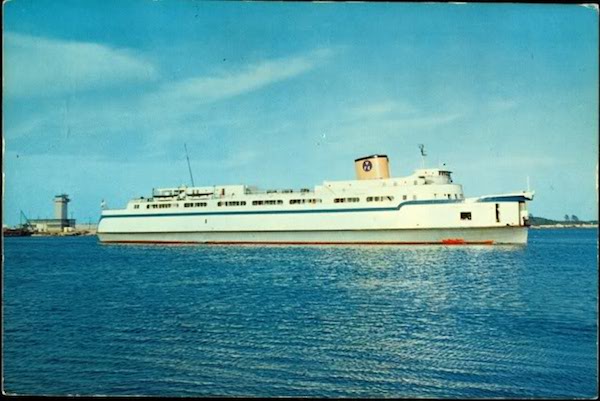
1950s post card of the Princess Anne steam ferry departing Norfolk for Cape Charles. This was where Capt. Bill Evans got his start as an ordinary seaman — “as low as you could get.”
February 10, 2014
(EDITOR’S NOTE: Cape Charles Historical Society has for more than a decade been recording oral histories of the area’s earlier days. In 2006, Bill and Jan Neville interviewed the late Capt. Bill Evans. A grant from the Virginia Foundation for the Humanities enabled 15 interviews to be transcribed, and the Historical Society has made this one available for readers of the Wave. All the transcriptions may be read at the Cape Charles Museum.)
Excerpts from an interview with Bill and Jan Neville, March 31, 2006
PART ONE
Today is March 31st, 2006, and we’re talking with Captain Evans, his lovely wife, Grace is here with us, as is my brother, Junius, aka Jan. I don’t know where to start. I guess one of the things I was curious about, did you grow up around here?
No, I come from Pennsylvania. From the coal mines. Shamokin — that’s an Indian name.
(Grace): Tell them what you were in Pennsylvania. Weren’t you known as a bootlegger?
Yeah, I was a bootlegger in Pennsylvania. You go up in the mountains, you dig a hole and you go down and get the coal out. You’re a bootleg coal miner.
My brother-in-law is a coal miner in western Virginia. I didn’t know you mined coal!
My grandfather and my uncles, they were coal miners, authentic coalminers. I was a bootlegger.
When did you come here?
I come here the first day of January, 1938. I was 18 years old. My stepfather had married my mother and they lived in Shamokin for a while and then he decided to come down here. He took my mother and I went to Baltimore and got a job there on a riveting gang. And got laid off there and I started looking for another job and my mother told me to come on down here. So I come down here and that’s how I ended up down here. Yes, my stepfather was from Cape Charles. His name was Bernice Ward. I come down here and I wound up cutting wood for the house. They come got me one day and told me I had a job on the ferry. But come to find out my father’s father had spoke to one of the captains on the boat and that’s how I got the job.
Inside track! So where did you start out on the boat?
Just as low as you could get! Ordinary seaman. I had to get a lifeboat ticket first. Which I did. You had to have a year’s time on deck to get the lifeboat ticket.
So what did that qualify you to do?
A steamboat had to have so many men that had lifeboat tickets. We were a passenger ferry. That qualifies you to operate a lifeboat with a crew. You were in charge of the lifeboat.
What was the first steamer you worked on?
The Princess Anne. I started out on the Princess Anne. But the one I worked on the most was the Pocahontas. [Read more…]
ORAL HISTORY: A Chat with Alston Godwin
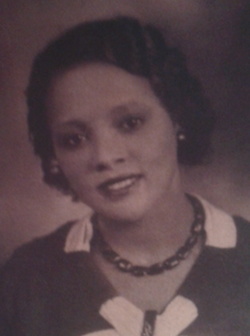
Alston Godwin as a young adult
January 26, 2014
(EDITOR’S NOTE: Cape Charles Historical Society has for more than a decade been recording oral histories of the area’s earlier days. In 2008, Bill and Jan Neville interviewed Alston Godwin, who was then 96. Mrs. Godwin lived to be 101, and her obituary may be read by clicking here.
A grant from the Virginia Foundation for the Humanities enabled 15 interviews to be transcribed, and the Historical Society has made this one available for readers of the Wave. All the transcriptions may be read at the Cape Charles Museum.)
Excerpts from an interview with Bill and Jan Neville, March 12, 2008
Entering the Funeral Business
The Funeral business started, my aunt and uncle [Mills Grey] established that business. I don’t think Uncle Mills was born here. But anyway, he and my aunt were very lovable people, lovable to each other and all the people they came in contact with. He learned people and he worked to do that. He established himself and his memory was good for everything he had ever heard or seen. And so then, he got married and established his business. It was the first black business in Cape Charles. They had one white undertaker. This was in 1895. My aunt stuck right by him. She learned from him what he was doing, but he didn’t have her embalm and she didn’t want to embalm. And you know, I didn’t either! I’d work to do anything but that. I didn’t care for that. My daughter, Jennie Marie, used to hang around them. She wasn’t afraid of no dead people.
Now I’ll tell you how I came to [enter the funeral business]. My first year in college, we were having our Christmas vacation and I came home and Uncle Mills had just died and been buried. He hadn’t been buried very long and I said to my mother, ” Mama I think I would like to go spend a couple nights with Aunt Jenny.” She said, “I think Alston that’s a good idea.” So I went there and I was an excellent driver. I could drive anywhere. So then I went and when I got there, sure enough, she had a call out. And I drove the hearse for her. And she and I went and got the body. She went with me. Because she worked with her husband, too. She was with him all the time. So then I saw a need that I had to stay longer. I was going to stay there until this body was buried. My aunt wasn’t up to it.
Bill Neville: She didn’t have anybody else to help her after her husband died?
Oh yes, back then that’s one good thing. There was not a neighbor, white or black, that wouldn’t come if you called and do anything to help you. And they’d come and cook for her. I didn’t have to do any cooking. But I wanted to because I didn’t want to forget how to cook. Then I used to give them dinners and things to eat. [Read more…]



















